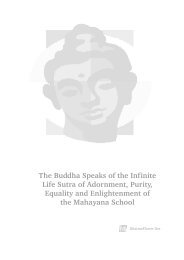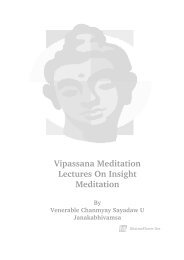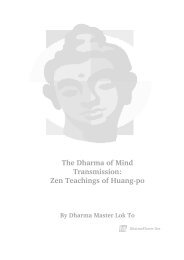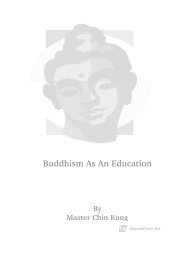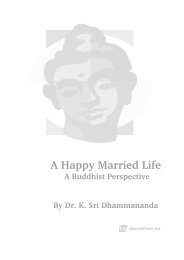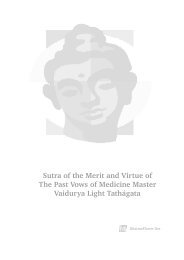THE FOUR NOBLE TRUTHS By Ajahn Sumedho - DharmaFlower.Net
THE FOUR NOBLE TRUTHS By Ajahn Sumedho - DharmaFlower.Net
THE FOUR NOBLE TRUTHS By Ajahn Sumedho - DharmaFlower.Net
You also want an ePaper? Increase the reach of your titles
YUMPU automatically turns print PDFs into web optimized ePapers that Google loves.
The Second Noble Truth does not ask you to think, ‘I have a lot ofsensual desires’, or, ‘I’m really ambitious. I’m really bhava tanha plus,plus, plus!’ or, ‘I’m a real nihilist. I just want out. I’m a real vibhavatanha fanatic. That’s me.’ The Second Noble Truth is not that. It is notabout identifying with desires in any way; it’s about recognisingdesire.I used to spend a lot of time watching how much of my practice wasdesire to become something. For example, how much of the goodintentions of my meditation practice as a monk was to become liked -how much of my relations with other monks or nuns or with laypeople had to do with wanting to be liked and approved of. That isbhava tanha - desire for praise and success. As a monk, you have thisbhava tanha: wanting people to understand everything and toappreciate the Dhamma. Even these subtle, almost noble, desires arebhava tanha.Then there is vibhava tanha in spiritual life, which can be very selfrighteous:‘I want to get rid of, annihilate and exterminate thesedefilements.’ I really listened to myself thinking, ‘I want to get rid ofdesire. I want to get rid of anger. I don’t want to be frightened orjealous any more. I want to be brave. I want to have joy and gladnessin my heart.’This practice of Dhamma is not one of hating oneself for having suchthoughts, but really seeing that these are conditioned into the mind.They are impermanent. Desire is not what we are but it is the way wetend to react out of ignorance when we have not understood theseFour Noble Truths in their three aspects. We tend to react like this toeverything. These are normal reactions due to ignorance.But we need not continue to suffer. We are not just hopeless victims ofdesire. We can allow desire to be the way it is and so begin to let go ofit. Desire has power over us and deludes us only as long as we graspit, believe in it and react to it.GRASPING IS SUFFERINGUsually we equate suffering with feeling, but feeling is not suffering. Itis the grasping of desire that is suffering. Desire does not causesuffering; the cause of suffering is the grasping of desire. Thisstatement is for reflection and contemplation in terms of yourindividual experience.You really have to investigate desire and know it for what it is. Youhave to know what is natural and necessary for survival and what isnot necessary for survival. We can be very idealistic in thinking thateven the need for food is some kind of desire we should not have. Onecan be quite ridiculous about it. But the Buddha was not an idealist



